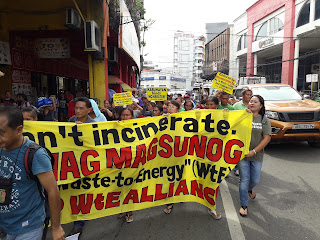Cebu’s Incinerator Plan Draws Flak from Informal Waste Workers
The proposed construction of a waste
incinerator at the Inayawan landfill site as announced by Cebu City Mayor Tommy Osmeña has drawn flak from
informal recyclers and environmentalists who assert that burning waste will
hurt recycling jobs and harm ecosystems, aside from putting the health of
communities at risk.
At a workshop co-organized by the Freedom from Debt Coalition, Philippine
Earth Justice Center and Sanlakas of Cebu and the Quezon
City-based EcoWaste Coalition, 120 participants, including 80 members of the
informal waste sector (IWS) expressed concern over the adverse impacts of incinerating
discards to their livelihood the environment, and public health.
“Many individuals, families and small businesses depend on the recovery of
recyclable materials to meet our basic needs. The waste incinerator will
compete for the same materials such as paper, corrugated box, plastic and other
recyclables that we collect, sort and sell,” said Aniceta Abadejao of the Gagmayng Kristohanong Katilingban –
Inayawan.
“What will happen to us if the
recyclable materials, our source of livelihood, are taken away from us?
Waste incineration will rob us of our only source of income and
livelihood. Is this how the city government plan to repay us for our
environmental service?” she pointed out.
Aileen Lucero, National Coordinator of the EcoWaste Coalition, agreed stressing
“it will be unacceptable to deny
informal waste workers of useful materials for recycling-based jobs and
livelihoods, which are beneficial for the climate and environment.
Instead of making life more difficult for them, the authorities should find
ways and means to integrate the IWS as key partner in the implementation of the
city’s waste management plan. ”
According to Lea Guerrero, Climate and Clean Energy Campaigner of the Global
Alliance for Incinerator Alternatives, “recycling and other zero waste
practices conserve finite natural resources, avoid fossil fuel extraction and
reduce greenhouse gas emissions from the use of virgin materials and from waste
disposal activities.”
In contrast, waste incineration
destroys resources and creates additional need to extract more of the earth’s
resources. It also takes away jobs and abets climate change. Incineration is
also a major source of dioxins and furans, which are recognized as
cancer-causing toxic emissions.
To call attention to their plight, the
informal waste workers, joined by their allies from various civil society
groups, marched to the Cebu City Hall right after the workshop to present their
opposition to the proposed incineration facility.
Through a petition, they told Mayor Osmeña that resorting to waste incineration
will not solve Cebu City’s enormous garbage production.
“We urge Mayor Osmeña to call off his plan to set up an incinerator and to
focus on comprehensive people-driven waste prevention and reduction programs,
including mandatory waste segregation at source, intensive recycling and
composting and inclusion of the IWS,” the groups said.
According to a UN-supported study, Cebu City generates about 500 ton of solid
waste per day or approximately 182,500 tons per year with average daily waste
generation per capita at 500 grams.
-end-
Reference:
http://www.waste.ccacoalition.









Comments